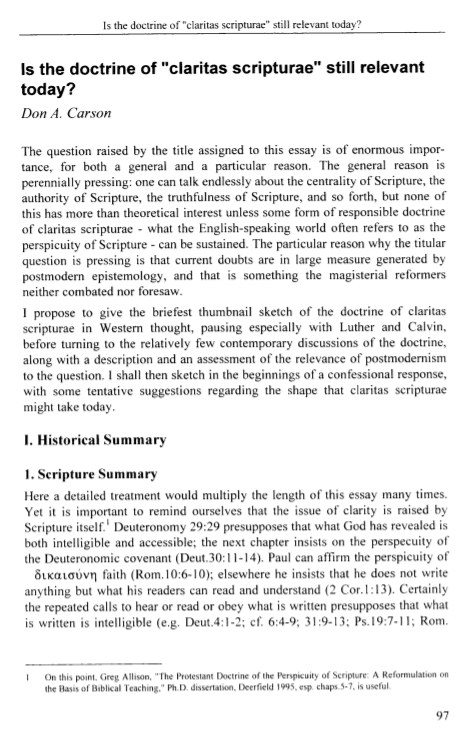A Brief Article Summary from Books At a Glance
by Steve West
Note: You can access the entire article here.
Summary
The doctrine of the clarity or perspicuity of Scripture is perennially important. The authority of Scripture can only be of theoretical and not practical interest unless there is a responsible understanding of claritas scripturae. This is pressing today in a new way because of postmodern epistemology.
Numerous biblical texts teach the clarity of Scripture. Scripture is seen as a light that gives understanding and the presupposition is that people can understand its teaching. The church fathers taught that the Scriptures were clear; the doctrine of perspicuity was not an invention of the Reformation. The fathers recognized that some misinterpreted the Scriptures, but they did not believe that was owing to a defect in Scripture, but to the interpreter. They also resorted to allegory to clear up difficulties. Augustine held to multiple meanings of biblical passages and believed that God had intended some passages to be interpreted figuratively.
With some exceptions, the doctrine of the clarity of Scripture faded in the medieval period, but was restored in the Magisterial Reformation. Scholars agree that claritas scripturae was of fundamental importance to both Luther and Calvin. This was true in both their positive writings and in their challenges to opponents. Perspicuity is everywhere assumed in Calvin’s theological treatises and commentaries. His doctrine of divine accommodation in revelation establishes that God’s desire in communication is to be understood clearly. He believed we needed the Spirit to understand the Word aright, but this wasn’t owing to a defect in Scripture’s clarity; it was owing to the moral defects of our sinful nature. . . .
[To continue reading this summary, please see below....]The remainder of this article is premium content. Become a member to continue reading.
Already have an account? Sign In
Buy the books

IS THE DOCTRINE OF "CLARITAS SCRIPTURAE" STILL RELEVANT TODAY?, by Don A. Carson